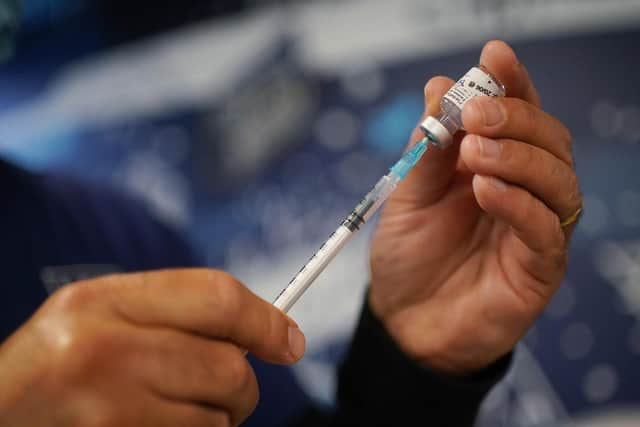New Covid-19 variant detected in Northern Ireland
and live on Freeview channel 276
A new Covid-19 variant has been identified in Northern Ireland, the Public Health Agency (PHA) has confirmed.
The autumn Covid and flu vaccination programmes in the region were brought forward as a precaution against the latest Omicron subvariant, BA.2.86.
Advertisement
Hide AdAdvertisement
Hide AdBA.2.86 was first identified in the UK in August and the PHA said there are now a small number of cases in Northern Ireland.


Health experts have said there is no evidence the new strain is more likely to make people seriously ill than other variants in circulation, while vaccination is likely to provide ongoing protection.
In its latest Covid-19 epidemiological bulletin, the PHA said in the week ending October 1, the number of new Covid infection episodes detected through clinical and routine testing was 448, a slight increase when compared to 441 in the previous week.
It added: “There has now been a small number of confirmed cases of BA.2.86 identified in NI. There is no evidence at this time that this variant causes more severe disease or spreads more easily compared to other currently circulating variants.”
Advertisement
Hide AdAdvertisement
Hide AdRelating to Covid-19 infections in care homes, the bulletin said: “There has been an increase in the number of new outbreaks in the current week compared to the previous week; with 11 new outbreaks reported in week 39; compared to 7 in the previous week.
“There has been a slight decrease in the number of community-acquired emergency Covid-19 hospital admissions, with 65 admissions in the current week compared to 67 in the previous week.
“The 80+ year-old age group had the majority of community acquired emergency Covid-19 hospital admissions in week 39 (40.0%). There has been a general increasing trend in the number of community-acquired emergency Covid-19 inpatients in the most recent week.”
The report said in the week ending September 29 there were 10 Covid registered deaths in Northern Ireland.
Advertisement
Hide AdAdvertisement
Hide AdNorthern Ireland’s chief medical officer Sir Michael McBride has previously urged people to come forward for their vaccinations to reduce pressure on Northern Ireland’s hospitals this winter.
Sir Michael said that while the threat from Covid has reduced, it is still capable of causing serious illness and death.
The Covid-19 booster vaccine in Northern Ireland is currently being offered to the following groups:
– all residents and staff in care homes;
– all adults aged 65 years and over on 31 March 2024;
– persons aged six months to 64 years in a clinical risk group;
– frontline health and social care workers;
Advertisement
Hide AdAdvertisement
Hide Ad– persons aged 12 to 64 years who are household contacts of people with immunosuppression; and
– persons aged 16 to 64 years who are carers.
Those eligible for flu vaccine in 2023/24 are:
– all preschool children aged two to four years on September 1 2023;
– all primary and secondary (up to and including year 12) school children;
– those aged six months to under 65 years in clinical risk groups;
– all those aged 65 years and over on 31 March 2024;
– pregnant women;
– those in long-stay residential care homes;
– carers;
– close contacts of immunocompromised individuals; and
– frontline health and social care workers.